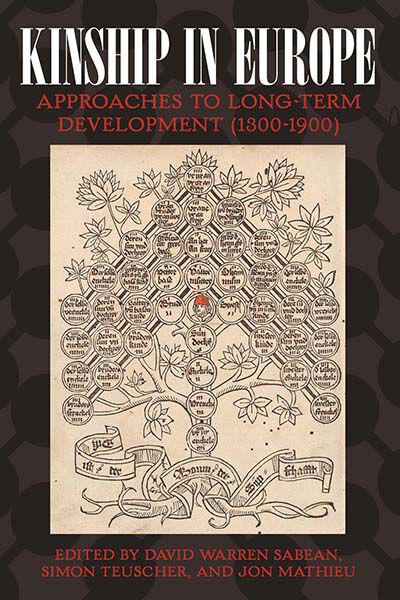
See Related
History JournalsEmail Newsletters
Sign up for our email newsletters to get customized updates on new Berghahn publications.
Kinship in Europe
Approaches to Long-Term Development (1300-1900)
Edited by David Warren Sabean, Simon Teuscher and Jon Mathieu
352 pages, 9 illus., bibliog., index
ISBN 978-1-84545-288-9 $135.00/£104.00 / Hb / Published (October 2007)
ISBN 978-1-84545-720-4 $34.95/£27.95 / Pb / Published (January 2010)
eISBN 978-1-80758-729-1 eBook
Reviews
THIRD PRIZE IN THE CATEGORY OF HISTORY BOOKS IN THE EARLY MODERN PERIOD
Awarded for 2009 by H-Soz-und-Kult
"As synthesis and provocative impulse this volume offers a stimulating overview of recent social and cultural-historical research on kinship."
“This is a volume that few historians can afford to ignore. It not only makes accessible and relevant a conspicuous body of recent work on kinship in Europe between the fourteenth and the nineteenth centuries, but also offers some startling key hypotheses and a whole research agenda. Unlike many collective volumes, this one is not a mere assemblage of papers gathered around a common topic (let alone a catch-all phrase). On the other hand, nor is it an impenetrable volume for specialists working in a tightly defined field.” · Mediterranean Historical Review
“...the three editors have done a fine job in integrating the individual studies and in ensuring that the English translations (by four different translators) read smoothly throughout. Standardization was a particularly important task.” · JRAI
“On the whole, the general arguments made here for the continued importance of kinship in modernity, as well as the two major changes in kinship organization, are convincing. Kinship in Europe is also to be commended for its impressive array of subjects and the admirably diverse nature of its contributors. Above all, it manages to complicate traditional narratives of modernity, and provides a less simplistic, linear model of development." · H-German
“…a refreshing new way to look at European history through the lens of kinship. ..This volume challenges the artificial division between so-called traditional and modern societies.” · Sixteenth Century Journal
“[This volume] is without doubt one of the most stimulating books that have recently been published in the field of the history of the family and parenthood. It appears at a crucial moment when the latter is about to sever its links with historical demography and to attract more and more scholars in anthropology, legal, social, and literary history…overcoming the traditional divisions between the different disciplines in the humanities.” · Annales de Démographie Historique
Description
Since the publication of Philippe Ariès’s book, Centuries of Childhood, in the early 1960s, there has been great interest among historians in the history of the family and the household. A central aspect of the debate relates the story of the family to implicit notions of modernization, with the rise of the nuclear family in the West as part of its economic and political success. During the past decade, however, that synthesis has begun to break down. Historians have begun to examine kinship - the way individual families are connected to each other through marriage and descent - finding that during the most dynamic period in European industrial development, class formation, and state reorganization, Europe became a “kinship hot” society. The essays in this volume explore two major transitions in kinship patterns - at the end of the Middle Ages and at the end of the eighteenth century - in an effort to reset the agenda in family history.
David Warren Sabean has taught at the University of East Anglia, University of Pittsburgh, Cornell University, and UCLA. He was a fellow of the Max Planck Institute for History and the Wissenschaftskolleg zu Berlin. He is a fellow of the American Academy of Arts and Sciences, and has been the recipient of an Alexander von Humboldt Foundation Forschungspreis. He is currently the Henry J. Bruman Professor of German History at UCLA.
Simon Teuscher has taught at UCLA and has been a member in residence at the Institute for Advanced Study in Princeton. He is presently a professor of Medieval History at the University of Zurich.
Jon Mathieu has taught in various universities in Switzerland and other countries. He was the founding director of the Istituto di Storia delle Alpi at the University of Lugano. Currently he is a professor at the University of Lucerne.




